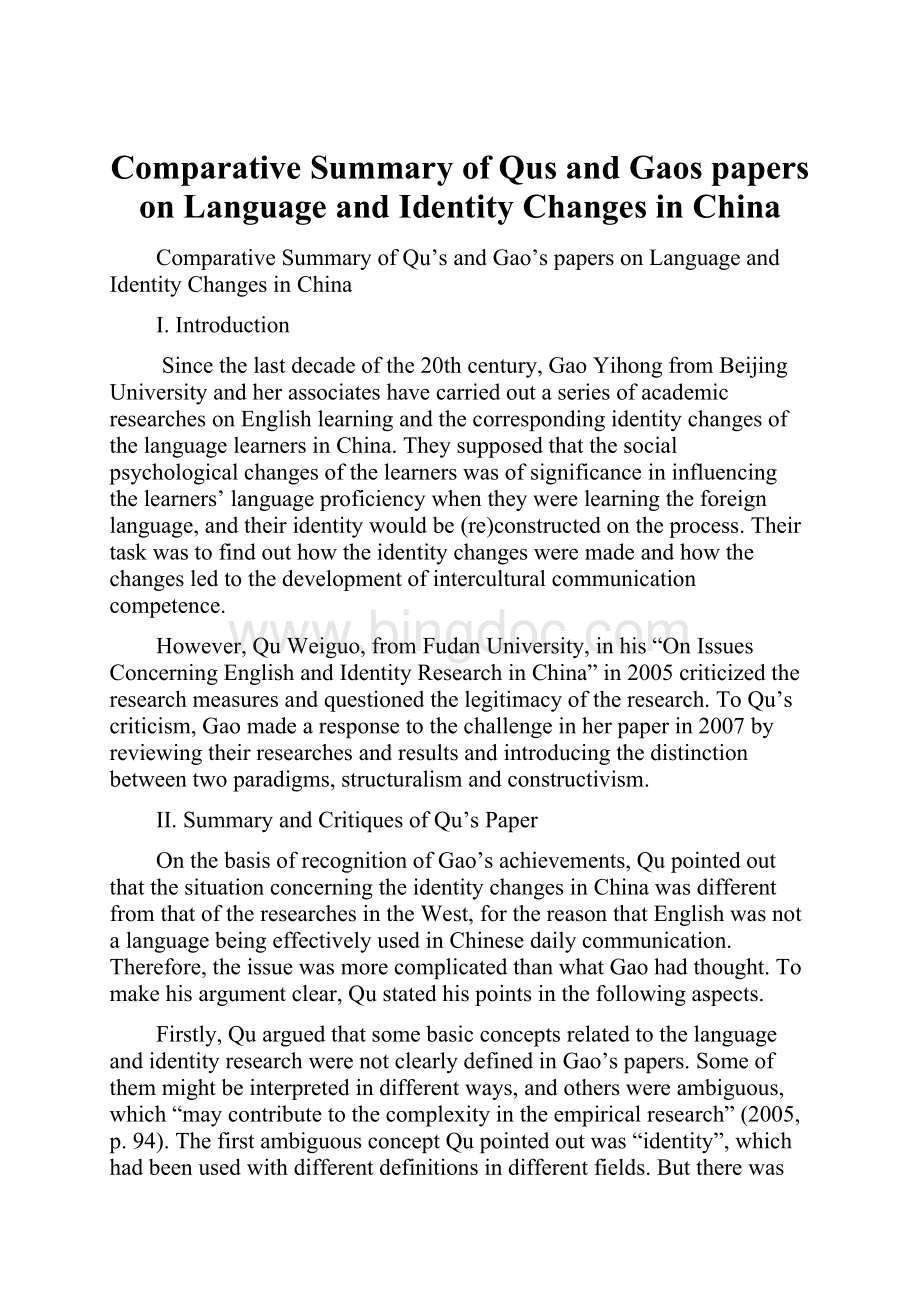 Comparative Summary of Qus and Gaos papers on Language and Identity Changes in China.docx
Comparative Summary of Qus and Gaos papers on Language and Identity Changes in China.docx
- 文档编号:4623005
- 上传时间:2023-05-07
- 格式:DOCX
- 页数:7
- 大小:20.10KB
Comparative Summary of Qus and Gaos papers on Language and Identity Changes in China.docx
《Comparative Summary of Qus and Gaos papers on Language and Identity Changes in China.docx》由会员分享,可在线阅读,更多相关《Comparative Summary of Qus and Gaos papers on Language and Identity Changes in China.docx(7页珍藏版)》请在冰点文库上搜索。

ComparativeSummaryofQusandGaospapersonLanguageandIdentityChangesinChina
ComparativeSummaryofQu’sandGao’spapersonLanguageandIdentityChangesinChina
I.Introduction
Sincethelastdecadeofthe20thcentury,GaoYihongfromBeijingUniversityandherassociateshavecarriedoutaseriesofacademicresearchesonEnglishlearningandthecorrespondingidentitychangesofthelanguagelearnersinChina.Theysupposedthatthesocialpsychologicalchangesofthelearnerswasofsignificanceininfluencingthelearners’languageproficiencywhentheywerelearningtheforeignlanguage,andtheiridentitywouldbe(re)constructedontheprocess.Theirtaskwastofindouthowtheidentitychangesweremadeandhowthechangesledtothedevelopmentofinterculturalcommunicationcompetence.
However,QuWeiguo,fromFudanUniversity,inhis“OnIssuesConcerningEnglishandIdentityResearchinChina”in2005criticizedtheresearchmeasuresandquestionedthelegitimacyoftheresearch.ToQu’scriticism,Gaomadearesponsetothechallengeinherpaperin2007byreviewingtheirresearchesandresultsandintroducingthedistinctionbetweentwoparadigms,structuralismandconstructivism.
II.SummaryandCritiquesofQu’sPaper
OnthebasisofrecognitionofGao’sachievements,QupointedoutthatthesituationconcerningtheidentitychangesinChinawasdifferentfromthatoftheresearchesintheWest,forthereasonthatEnglishwasnotalanguagebeingeffectivelyusedinChinesedailycommunication.Therefore,theissuewasmorecomplicatedthanwhatGaohadthought.Tomakehisargumentclear,Qustatedhispointsinthefollowingaspects.
Firstly,QuarguedthatsomebasicconceptsrelatedtothelanguageandidentityresearchwerenotclearlydefinedinGao’spapers.Someofthemmightbeinterpretedindifferentways,andotherswereambiguous,which“maycontributetothecomplexityintheempiricalresearch”(2005,p.94).ThefirstambiguousconceptQupointedoutwas“identity”,whichhadbeenusedwithdifferentdefinitionsindifferentfields.Buttherewasnoonethatwasdefiniteandpreciseandwasacceptedwidely.QufurthernarrowedthedomainofthetermusedinpsychologyandsocialpsychologypresentedbySters&Burke(2000).Intheiraccount,“thereferentofidentityreferstoeitherroleormembership”(Qu,2005).Yet,anotherproblemaroseintheirtheoryconcerning“identitytheory”and“socialidentitytheory”.Notonlycouldtheymaketheirtheoryclearlystated,butalsotherewasvaguenessandobscurityexistinginthedefinientia,especiallyabouttheterms“categorization”and“membership”usedinthedefinientiaandotherambiguoustermsinvolved.
Qufurtherarguedthatconsideringapersonhaddifferentidentitiesindifferentsituations,onewouldacquireasetofidentities,whichwascalled“identitycapital”byCote(2002).However,thisconceptitselfwasambiguousandtheproblemsinvolvedmadeitmorecomplicated.Sincethediscussionwasaboutthe(re)constructionofidentity,itwasimportanttomakeacleardistinctionabouttheincomingandexistingentities.Therelationsandtheinteractionbetweentwoidentitycapitalswerecrucialissuesbuttoocomplexwithmanypossibilities.Anditwasevenhardertoknowthemeaningof“identitychange”andtheresultsthatthechangemightbringabout.Whatisworse,noanyresearchhadbeendoneaboutthecontextwherethechangemightbringaboutandaswellasthelengthandthestabilityofthechange.
Qualsostressedthateventhoughtheimportanceofthelanguageontheconstructionofidentitywaswidelyacknowledged,therewasnodefinitestatementorempiricalresearchonthecontributionthataforeignlanguagecoulddototheidentitychange.AccordingtoLambert’stheory(1974),someconditionsrelatedtothepossiblecontributionofasecondlanguagemustbefulfilled.However,QustatedthatthoseconditionswereallobstaclesinGao’ssituation.Forexample,the“proficiency”,whichmayleadtothechangesinidentity,washardtobemeasuredbyanacceptablestandard.Thebilingualcommunitywasanotherconditionwiththechange,whichdidnotactuallyexistinChina.Hence,the“identitycontexts”,wheretheforeignlanguagewasusedinthecommunication,rarelyexistedinChina.
Secondly,whengoingontalkingabouttheassumptionsandthepresuppositionunderlyingtheresearch,QustatedthattheconditionsoftheresearchinChinaweredifferentfromthoseofthepreviousresearchesandevenmorecomplicated.Qufirstanalyzedthatthepurposesandthecompositionofthesecond-languagelearners,mostofwhomwerestudentsforeducationorcertificatesandemployeesforpromotion.Theylearnedtheforeignlanguagenotfortheuseinthedailycommunicationbutforsomemorepracticalpurpose.AlthoughthereweresuchpeoplewhousedEnglishintheirdailyworkastheEnglishteachers,interpretersandthestaffinsomecompaniesoragencies,Qupointedoutthattheystillcouldnotbetreatedasthemembersinabilingualspeechcommunitybecausetheydidnotinteractwitheachotherintheforeignlanguagebutwiththoseoutsideoftheirspeechcommunity.OnaccountofthefactthattheyardstickofthelanguageproficiencywashardtosetupandthecontextwhereaforeignlanguagewasusedinChinawasartificial,Qureachedtheconclusionthat“EnglishinChinaisthusamuchlearntlanguagebutnotausedone”(2005,p.106)and“…Englishisnotafunctionalchannelforcommunicationexceptforthefewwhoworkwithforeignnationals”(2005,p.107)inChina.
Besides,onidentityandChineseidentity,Qualsocriticizedthatthedistinctionsamong“identity”,“Chineseidentity”and“culturalidentities”wereblurandmisusedinGao’sresearch.InGao’spreviousstudy(2005),thequestionstotheinformantswerenotconcernedabouttheChineseidentityorevenculturalidentities.Inaddition,giventhecomplexityofthecorecomponentsoftheChinesecultureandthedisruptionoftraditionafterthefoundationofanewChina,whatthecentralcharacteristicsofChineseidentitywereneededdiscussinganddelimiting.Onlywhenthesehadbeendonecouldtheresearchontheidentitychangesbevalidandmeaningful.
Atlast,whentalkingabouttherelationshipsbetweenEnglishandidentitychange,Qupointedoutthatthelanguagelearnerswereexposedtothewesternvaluesandbeliefsinmanyways,whichwasagainsttherequirementofexclusivenessoftheagency.Therefore,theidentitychangecouldnotbeprovedtobetheimpactofthelanguagelearning.
Quendedhiscritiqueswithsomesuggestionsonthesolutionstotheproblemshehadpresented.
Thiswasaveryinterestingandinstructivepaper,inwhichtheauthorpresentedhisdoubtandcritiqueaboutGao’sresearchesandmadesomesuggestionstoherfutureresearch.Thepaperwaswellorganizedinexpoundingtheauthor’sopinioninthreesections.Afterexplaininghispurposeofthispaper,theauthormadehisargumentwithdetailedquotationsandclearanalysis.Someofhisideaswerepositiveandavailable,whichmightbeofgreatsignificance.However,thepaperwasabitmorewordywhentheauthortriedtoprovehispoints.Itwastherepetitionthatweakenedthepaper’spower.Besides,eventhoughGao’sresearchwouldhavebeenbetterifshehadhadamoreexplicitexplanationoftheconceptsshehadusedinherresearch,IstillthoughtthatQu’scriticismonthedefinitionwastoostrict.Inthedomainofsocialandpsychologicalfields,thesphereandthereferentofsometermcouldnotbesofixedandstatic.Inaddition,Qu’sdiscussionwouldhavebeenmorepersuasiveiftheauthorhadprovidedsomepracticalsolutionstotheproblemshehadputupinthepaper.
III.SummaryandCritiquesofGao’sPaper
AsthispaperwastorespondtoQu’scriticism,Gaofirstover-viewedherresearcheson“bestforeignlanguagelearners”andonordinarylearnerswithabriefintroductiontotheirquantitativeandqualitativeresearches.AfterasummaryofQu’squery,Gao(2007)putforwardanewargumentthatthedisputeabout“identity”wasnotonlyabout“theontologicalissue”butalsoabout“theepistemologicalparadigmsconcerninghowtheknowledgeofidentityisobtainedordeveloped”(2007,p.103).
Togoonwiththeanalysis,Gaointroducedthedistinctionbetweenstructuralismandconstructivism.Structuraliststookthestructurestaticandhierarchical.Theyemphasizedthesystematicinterrelationshipsamongtheelementsofanyhumanactivity.Theirtaskwastofindouttheobjectivismandessentialismamongtheinterrelationships.Incontrast,constructivismlaidemphasisonthewaysthatpeoplecreatedtheworldthroughaseriesofindividualconstructs.Constructivistsstressedtheinteractionandtheprocesswheretheinteractionconstructed.
Onthebasisofthetheory,GaofurtherarguedthedifferentwaystotreattheambiguousconceptsQuhaddoubted.Structuralistsregardedidentityasadefiniteandrealentitywhichcouldbeunpackedandanalyzedwithquantifiableevidence.Whileintheconstructivistperspective,identitywasmultipleanddynamic,anditdevelopedintheinteractionbetweentheindividualandtheenvironment.Therelationshipbetweenlanguagelearningandidentitychangewasnotalinearcause-effectasstructural-positivistapproachbut“multipleandcomplex,sometimesreciprocal”(Gao,2007,p.105).Aboutthespeechcommunity,Gaowasagainsttheclearboundaryofbilingualismandmonolingualism,butthoughtthedistinctionwasnotclearandchangeableonaccountofthelearners’highmotivationandsubjectiveefforts.
Tosupportherargument,Gaopresentedthecurrentresearchtrend,whichwasashiftfromstructuralismtoconstructivisminthefieldofsocia
- 配套讲稿:
如PPT文件的首页显示word图标,表示该PPT已包含配套word讲稿。双击word图标可打开word文档。
- 特殊限制:
部分文档作品中含有的国旗、国徽等图片,仅作为作品整体效果示例展示,禁止商用。设计者仅对作品中独创性部分享有著作权。
- 关 键 词:
- Comparative Summary of Qus and Gaos papers on Language Identity Changes in China
 冰点文库所有资源均是用户自行上传分享,仅供网友学习交流,未经上传用户书面授权,请勿作他用。
冰点文库所有资源均是用户自行上传分享,仅供网友学习交流,未经上传用户书面授权,请勿作他用。
链接地址:https://www.bingdoc.com/p-4623005.html


 《篮球行进间单手低手投篮》教学设计.docx
《篮球行进间单手低手投篮》教学设计.docx
